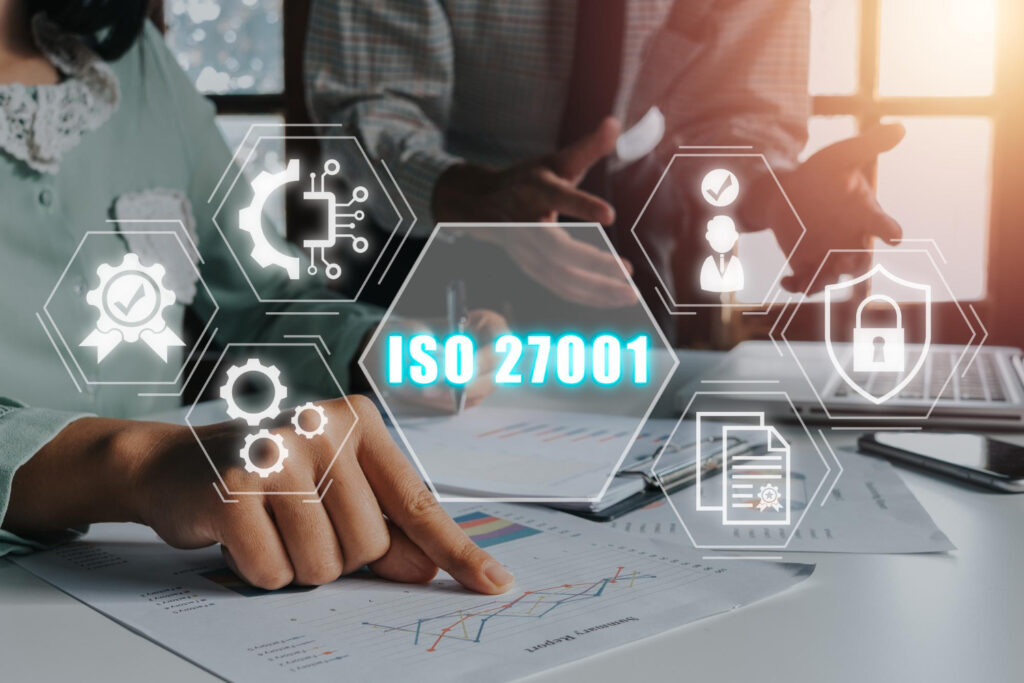
Keeping information safe is crucial for any business. This is where ISO27001 comes into play. ISO27001 is an international standard for information security management. It helps businesses protect their data and manage risks effectively. By following this standard, companies can ensure they handle information securely, which is essential in building trust with clients and partners.
But what exactly is ISO27001, and why should your business consider it? Well, it’s more than just a set of guidelines. ISO27001 lays out a systematic approach to managing sensitive information. It covers people, processes, and IT systems by applying a risk management process. This helps businesses identify potential risks and put measures in place to prevent security breaches.
Following ISO27001 provides many benefits. It improves security, increases customer confidence, and helps maintain compliance with legal requirements. Furthermore, it gives businesses a competitive edge by showcasing their commitment to maintaining high security standards.
In this article, we will delve into what ISO27001 is all about and why it is essential for your business. We’ll look at the benefits it offers, the steps to achieve certification, and how to maintain compliance.
What is ISO27001?
ISO27001 is an international standard that focuses on information security management. It provides a framework for businesses to manage and protect their sensitive information systematically. The goal is to safeguard data from threats such as breaches, theft, and loss.
This standard outlines the requirements for establishing, implementing, maintaining, and continually improving an Information Security Management System (ISMS). An ISMS includes policies, procedures, and controls designed to protect information. This involves everything from managing passwords and encrypting data to training employees and conducting regular security audits.
One key aspect of ISO27001 is its risk management approach. It requires businesses to identify potential risks to their information and assess their impact. By understanding these risks, companies can take appropriate measures to mitigate them. This proactive approach helps prevent security incidents before they occur.
Gaining ISO27001 certification means that an independent body has verified that your business meets the standard’s requirements. This certification demonstrates a commitment to best practices in information security, which can build trust with clients, partners, and regulators.
The Benefits of ISO27001 for Your Business
Achieving ISO27001 certification offers several significant benefits for your business. Here are some of the key advantages:
1. Enhanced Security: By implementing ISO27001, we can better protect our information from threats. This includes safeguarding sensitive customer data, intellectual property, and internal business details. Improved security measures help prevent breaches and cyberattacks.
2. Increased Customer Trust: Clients are more likely to trust a business that takes information security seriously. ISO27001 certification shows that we adhere to high security standards, boosting our reputation and making us a preferred choice for clients.
3. Legal Compliance: Many laws and regulations require businesses to protect personal data. By following ISO27001, we ensure compliance with these legal requirements, avoiding potential fines and legal issues.
4. Competitive Advantage: Being ISO27001 certified sets us apart from competitors. It demonstrates our commitment to security and can be a decisive factor for clients when choosing between businesses.
5. Improved Processes: Implementing ISO27001 helps streamline our security processes. This leads to more efficient operations and reduces the chance of errors or oversights. It encourages a culture of continuous improvement.
Risk Management: ISO27001’s risk assessment approach allows us to identify and address potential threats. By being proactive, we can prevent security issues before they affect our business.
The benefits of ISO27001 are clear. It enhances security, builds trust, ensures compliance, provides a competitive edge, improves processes, and helps manage risks. These advantages contribute to the overall success and stability of our business.
Steps to Achieving ISO27001 Certification
Achieving ISO27001 certification involves several key steps. These steps help ensure that our business fully complies with the standard’s requirements and builds a strong information security management system.
1. Gap Analysis: Start by conducting a gap analysis to see where we stand. This involves comparing our current information security practices with ISO27001 requirements. The gap analysis helps identify areas that need improvement.
2. Scope and Objectives: Define the scope of our Information Security Management System (ISMS). This involves determining which parts of our business will be covered by ISO27001. We also need to set clear objectives for our ISMS.
3. Risk Assessment: Conduct a thorough risk assessment to identify potential threats to our information security. We should analyse these risks and determine their impact on our business.
4. Policy Development: Develop and implement information security policies and procedures. These policies provide a framework for managing risks and ensuring compliance with ISO27001.
5. Training and Awareness: Train our employees on information security practices and the importance of ISO27001. Awareness programs help ensure that everyone understands their role in maintaining security.
6. Implement Controls: Implement the necessary security controls to mitigate identified risks. Controls can include technical measures like firewalls and encryption, as well as organisational measures like access controls and incident response plans.
7. Internal Audit: Conduct an internal audit to check if our ISMS meets the requirements of ISO27001. This helps identify any areas that need further attention before the certification audit.
8. Certification Audit: Engage an accredited certification body to perform the certification audit. The auditor will assess our ISMS to ensure it complies with ISO27001. If we meet the requirements, we will receive the ISO27001 certification.
Maintaining ISO27001 Compliance and Best Practices
Maintaining ISO27001 compliance is an ongoing process. It requires continuous effort and attention to ensure our information security measures remain effective. Here are some best practices to help us maintain compliance:
1. Regular Audits: Conduct regular internal audits to check our ISMS. These audits help identify any potential issues and ensure that our practices align with ISO27001 requirements.
2. Continuous Risk Management: Regularly review and update our risk assessments. New threats can emerge over time, and it’s important to stay proactive in identifying and addressing them.
3. Employee Training: Keep our team informed and trained on information security practices. Regular training sessions and awareness programs help maintain a security-conscious culture within our organisation.
4. Update Policies and Controls: Update our information security policies and controls as needed. As our business evolves, our security measures should evolve too. Make sure they remain relevant and effective.
5. Management Review: Hold regular management reviews to evaluate the performance of our ISMS. This involves assessing the effectiveness of our security measures, reviewing incident reports, and making necessary improvements.
6. Incident Response: Maintain a robust incident response plan. This plan should outline clear steps for dealing with security incidents, including detection, response, and recovery.
7. Stay Informed: Keep abreast of changes in information security regulations and best practices. Being informed helps us adapt to new requirements and maintain compliance.
By following these best practices, we can ensure that our business remains secure and compliant with ISO27001.
Conclusion
ISO27001 certification offers many benefits for our business. It enhances information security, builds customer trust, ensures legal compliance, and provides a competitive edge. Achieving and maintaining ISO27001 certification requires a structured approach. We need to conduct gap analyses, define our ISMS scope, assess risks, develop policies, train employees, implement controls, and conduct audits. By following these steps and maintaining best practices, we can ensure our information security remains robust and effective.
At Edara Systems Australia, we understand the importance of information security. We’re here to help you navigate the path to ISO27001 certification and maintain compliance. Contact us today to learn more about how we can support your business in achieving ISO27001 certification and ensuring the highest standards of information security.



